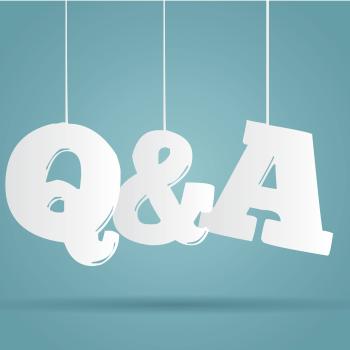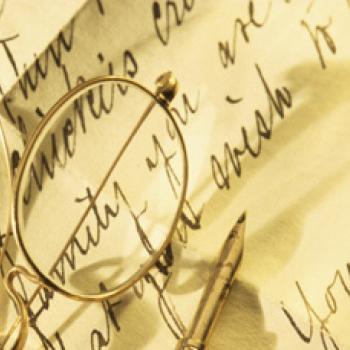Students explore the menu genre by analyzing existing menus from local restaurants. They review adjectives and descriptive writing and then work in groups to create their own custom menus.

Cooking Up Descriptive Language: Designing Restaurant Menus

Grades
|
Looking at Landmarks: Using a Picture Book to Guide Research
3 - 5
Lesson Plan
| Standard Lesson
This lesson uses Ben's Dream by Chris Van Allsburg to highlight ten major landmarks of the world. Students research the landmarks and present their findings to the class.

Grades
|
Question and Answer Books--From Genre Study to Report Writing
3 - 5
Lesson Plan
| Unit
After exploring several question and answer books on a variety of topics, students research a topic and create their own class question and answer book.

Grades
|
Literary Parodies: Exploring a Writer's Style through Imitation
9 - 12
Lesson Plan
| Standard Lesson
This lesson asks students to analyze the features of a poet's work then create their own poems based on the original model.

Grades
|
Paying Attention to Technology: Reviewing a Technology
9 - 12
Lesson Plan
| Standard Lesson
Students read and analyze technology reviews to establish the characteristics of the genre. They then compose their own reviews on a technology of their choice.

Grades
|
Focusing Reader Response Through Vocabulary Analysis
6 - 8
Lesson Plan
| Standard Lesson
Students suggest and categorize words that they associate with a novel they have recently read, ranging from details about the plot to feelings about a character.

Grades
|
Developing Reading Plans to Support Independent Reading
6 - 8
Lesson Plan
| Standard Lesson
Students analyze their past readings and use that knowledge to create reading plans for the future.

Grades
|
A Bear of a Poem: Composing and Performing Found Poetry
K - 2
Lesson Plan
| Standard Lesson
Children find favorite words, phrases, and sentences from familiar stories. Working together, they combine their words and phrases to create a poem. The poem is then shared as performance poetry.

Grades
|
Focus on First Lines: Increasing Comprehension through Prediction Strategies
9 - 12
Lesson Plan
| Recurring Lesson
Students examine opening sentences of texts they will read during a unit or course and make predictions. They return to their predictions throughout the course as they read the texts.

Grades
|
Analyzing Symbolism, Plot, and Theme in Death and the Miser
9 - 12
Lesson Plan
| Standard Lesson
Students apply the analytical skills that they use when reading literature to an exploration of the underlying meaning and symbolism in Hieronymous Bosch's early Renaissance painting Death and the Miser.

Grades
|
As Slippery as an Eel: An Ocean Unit Exploring Simile and Metaphor
K - 2
Lesson Plan
| Standard Lesson
Students play with simile and metaphor as they study the ocean and use figurative language to write a class book about it.

Grades
|
Connotation, Character, and Color Imagery in The Great Gatsby
9 - 12
Lesson Plan
| Unit
Students explore the connotations of the colors associated with the characters in F. Scott Fitzgerald's The Great Gatsby.

Grades
|
Discovering Traditional Sonnet Forms
9 - 12
Lesson Plan
| Standard Lesson
Students read sonnets, charting the poems' characteristics and using their observations to deduce traditional sonnet forms. They then write original sonnets, using a poem they have analyzed as a model.

Grades
|
Argument, Persuasion, or Propaganda? Analyzing World War II Posters
9 - 12
Lesson Plan
| Standard Lesson
Students analyze World War II posters, as a group and then independently, to explore how argument, persuasion and propaganda differ.

Grades
|
Ferocious Fighting Fish: An Ocean Unit Exploring Beginning Word Sounds
K - 2
Lesson Plan
| Standard Lesson
Focus students' attention on alliteration in this ocean-themed unit. Students explore alliteration in framing texts then compose their own class book to explore figurative language in their own writing.

Grades
|
Completing the Circle: The Craft of Circular Plot Structure
K - 2
Lesson Plan
| Standard Lesson
Students identify, explore and apply the elements of circle plot structures to their own stories by using graphic organizers, reading and writing stories, and using checklists to assess their work.

Grades
|
A Significant Influence: Describing an Important Teacher in Your Life
9 - 12
Lesson Plan
| Standard Lesson
In this project, students write tributes to teachers who have made a profound difference in their lives then publish their work in a class collection.

Grades
|
Bridging Literature and Mathematics by Visualizing Mathematical Concepts
3 - 5
Lesson Plan
| Standard Lesson
During interactive read-aloud sessions, students identify how an author conveys mathematical information about animals' sizes and abilities. They then conduct research projects focusing on the same mathematical concepts.

Grades
|
Building Vietnam War Scavenger Hunts through Web-Based Inquiry
9 - 12
Lesson Plan
| Standard Lesson
Students research the effects of the Vietnam war on a specific group of people who were involved. They then create Internet scavenger hunts to share with the class.

Grades
|
Talking, Writing, and Reasoning: Making Thinking Visible with Math Journals
3 - 5
Lesson Plan
| Standard Lesson
Students explore how their problem-solving strategies work by writing in math journals as they work in small groups to solve a math puzzle with multiple solutions.